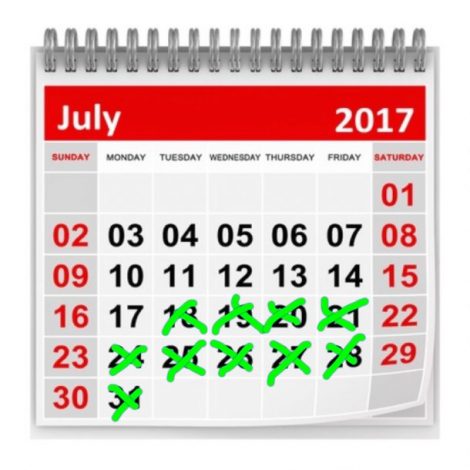
It used to be that you could get away with not putting a short term job on a resume. After all, short term jobs are technically frowned upon by hiring managers.
However, in this digital age, you may actually hurt yourself more if you don’t put the job on the resume.
This begs the question, how do you approach it?
The answer will vary based on the person’s situation and the nature of the departure.
You don’t want to come off as irresponsible by leaving it off your resume, but you also don’t want to lie.
And, of course, if your short term job departure is internationally known, well, then you have no choice but to leave it on your resume and be prepared to talk diplomatically about it (Tough break, there, Scaramucci.)
There are many grounded, normally long-term-employed people that enter a new job only to find out in a short period of time, it’s not the right place for them. All of the red flags seemed to be missed during the interview and they find themselves needing to leave after 10 days or two months.
So I write this article for the normal and grounded among us that just found ourselves in a bad situation.
For you, use our tips below to help you address a short term job on your resume. And Scaramucci, if you are reading, these may help you, too:
(1) Own the reason for leaving the job.
Whether you left the job for a good reason or a bad reason, you need to own it. Of course, depending on the situation there will be a couple of different ways to handle it.
If you had a positive experience at the job but it ended unexpectedly you can use it as an example of how you deal with adversity. Recruiters know that sometimes these things happen so this is a perfect opportunity to show your great attitude.
If your reason for departing is a bad one then it’s important that you be as diplomatic as possible. There’s no worse red flag than someone throwing a former employer under the bus, even if they did have a horrific experience and kind of deserve it.
Additionally, you can use the experience to your advantage. For example, if you left or were fired from the other position because you could not work copious amounts of overtime, but you were flexible to work five to fifteen hours of occasional overtime, and the prospective employer only needed periodic overtime that could be a good reason to bring up the conflict that led to the termination.
(2) Indicate the nature of your short term role.
If the position in question was contract or short term in nature then it’s in your best interest to mention that on the resume.
If you did contract roles back-to-back, then consider putting the client names and titles as bullets under one employment. For instance you can have a resume section titled, MARKETING CONSULTING ASSIGNMENTS (OVERALL DATE RANGE) and list each client, date, achievement and function title as a bullet under the employer heading. This can be much more visually appealing than having a separate heading for each one.
(3) Include everything on the employment application–it’s more important than the resume.
In the age of Google its imperative that you list everything on the employment application. Simply put, just because you don’t put your short term job on the application doesn’t mean they won’t find it.
Whereas on a resume you may be able to get away without mentioning it, an employment application is a totally different ball game. A resume is seen more as a marketing tool by employers, whereas an application is official documentation of your work history. It’s the application employers use to run your background check, not your resume, typically.
If you want to see some resume examples on how to handle short term jobs and receive instruction on how to handle interview questions regarding short term jobs, get our ‘GET HIRED FAST’package ($297) and put all of these concerns to rest:
Lisa Rangel – Executive Resume Writing Services
Daily Career Tips

Landing your next job doesn't have to be an overwhelming, frustrating or time-sucking task. Get daily tips on how to find the position you deserve, delivered right to your inbox:
- The #1 addition every resume needs in 2023 and beyond.
- How to get prepared for a job change even if you like the job you have.
- How to handle a chaotic job market and where to focus your job-seeking efforts (hint, it’s not the job boards).
- Where to find great jobs without submitting 500 meaningless job applications.
- How to slice through the Applicant Tracking System B.S. and land a 6- figure role you love.
- How to track down the “unpublished job market” and have your pick of the best jobs out there.
- How to write a resume that will hit hiring managers right between the eyes and have them scrambling to book your interview.
- How to get up to speed with your online branding and write a LinkedIn profile that positions you as the #1 expert in your field.
- How to approach job seeking with the “human touch” so you can keep the bots at bay.
- And finally, access to our 4-stage META Job Landing system we’ve used with thousands of job seekers just like you.

About Lisa
Lisa Rangel and The Chameleon Team are the only executive resume writing, LinkedIn profile development, and job landing consultancy who has been hired by LinkedIn and recognized by Forbes. Our 4-Stage META Job Landing System stems from decades of corporate and executive recruiting experience to position you to land your next 6 or 7-figure role faster.


 (917) 447-1815
(917) 447-1815